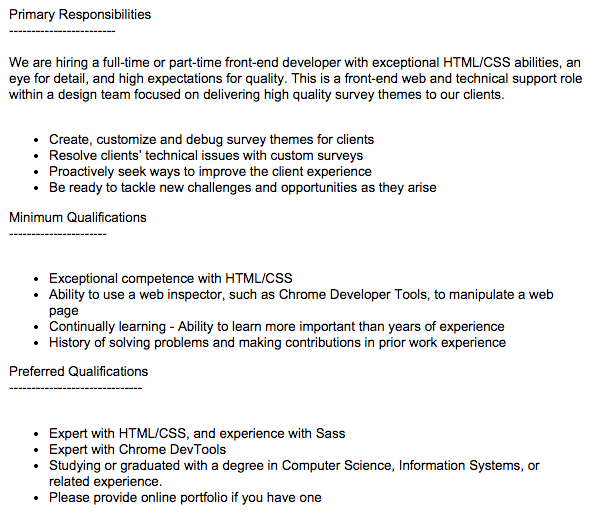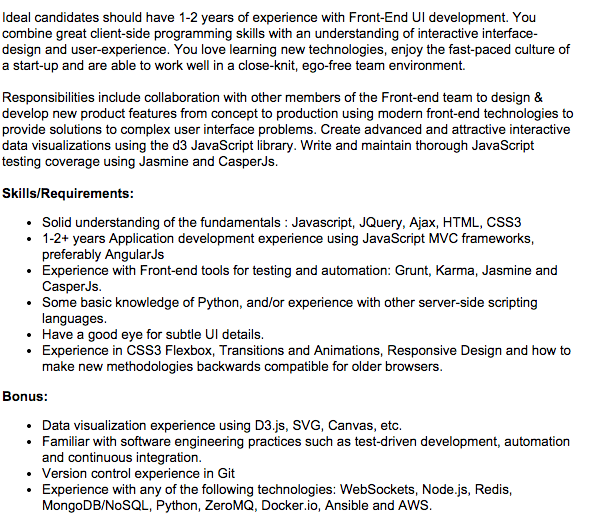
Image via Shutterstock
So you’ve decided to make a career change, and web development is calling your name. You know some of the basics—some HTML, maybe even a little CSS—but where do you go from there? What should you learn? What skills are in demand? When it comes to a career in web development, there’s so much variety, so much to know. But don’t worry: there’s an easy way to figure out which skills you’ll need to land the job you want.
Start by analyzing job descriptions for the roles that appeal to you most.
A version of this exercise by New York University’s Wagner Graduate School of Public Service can help you pinpoint today’s most in-demand skills.
How it Works
The first step is to look at several job postings. Sites like StackOverflow, LinkedIn, Monster, and Indeed will have plenty—after all, employers are always looking for skilled devs. While every job description is different, almost all contain two core elements: skills (the knowledge you need to do the job) and responsibilities (what you’ll actually be doing once you get the job). The items in each category are usually listed in order of importance.
Let’s look at two postings from Indeed.com. Both are for junior front-end devs, and both were posted by enterprise technology companies, but note the differences.
Job A

Image via Indeed.com
In this posting, the required skills include:
- Exceptional competence with HTML/CSS
- Ability to use a web inspector, such as Chrome Developer Tools, to manipulate a web page
- Continually learning. Ability to learn more important than years of experience
The responsibilities listed include:
- Create, customize, and debug survey themes for clients
- Resolve clients’ technical issues with custom surveys
“Just because you see a [programming] language listed on a job posting, don’t assume it means that you’ll never get the job without it.”
Job B

Image via Indeed.com
Here, the required skills include:
- Solid understanding of the fundamentals : JavaScript, JQuery, Ajax, HTML, CSS3
- 1-2+ years Application development experience using JavaScript MVC frameworks, preferably AngularJs
The responsibilities listed include:
- Collaborate with other members of the front-end team to design and develop new product features from concept to production using modern front-end technologies in order to solve complex user interface problems.
- Create advanced and attractive interactive data visualizations using the D3 JavaScript library.
Ask Yourself Three Questions
Before you start comparing job postings, take a moment to ask yourself the following:
When looking at job descriptions, what are three common skills that I both notice and am interested in?
With our sample descriptions, you probably noticed that front-end web development looks a little different at each company. One job description emphasizes HTML/CSS, while the other focuses on a suite of fundamentals and AngularJS. It may be challenging, but look for common threads. Focus on the in-demand skills that you’re most interested in learning. This will help you plan the educational growth you’ll need in order to change careers.
What’s one skill I can start strengthening right now?
After making your list of three skills that are in high demand, pick one that you can begin honing immediately. For example, maybe your knowledge of HTML is solid, but you need to learn more about JavaScript. Focusing on one desirable skill will give you an achievable goal and make the process of building your professional brand much more manageable.
What can I create to gain experience and demonstrate my mastery of this skill?
It’s one thing to tell a prospective employer that you have a particular skill—it’s quite another to be able to prove it. But the ability to prove it may be just the thing that makes you stand out from other applicants. Once you’ve identified an area of focus, determine what you can create to show what you’ve learned. Maybe it’s a personal website whose usability and usefulness you’ve improved via your new skill set. Maybe it’s a sample app you created in an online class.
Once you’ve determined the skills you want to focus on, build a portfolio of work that demonstrates those skills to prospective employers. That’s a savvy way to position yourself squarely in line for a great new job.
You Don’t Have to Know Everything
When looking at so many job ads, it’s easy to get discouraged by just how much there is to learn. But the truth about a career in development is that no one knows everything, and everyone’s always learning. Scott Kensell, a Udacity graduate who’s currently an iOS developer at Prezi, noted that learning new skills is fundamental to success as a developer.
“When I started at Prezi, I knew there was so much that I didn’t know.” Kensell said. But he added that Prezi, like so many technology companies, understands that no dev is ever going to know everything. “They’ve got a really mature understanding of how engineers work and learn. On my first day, they handed me a stack of books to read so I could add to my skills,” he said. “Just because you see a [programming] language listed on a job posting, don’t assume it means that you’ll never get the job without it.”
The Bottom Line
There’s a lot to learn when planning for a career in web development. Start by identifying the skills that are in demand for the kind of jobs you want. Then, make a plan to learn them at a reasonable, achievable pace. Remember that you don’t have to know everything there is to know in order to launch your new career—you just need to be willing to keep learning.
Give this activity a shot. Let us know what you learned in the comments section below. We’d love to hear from you!



